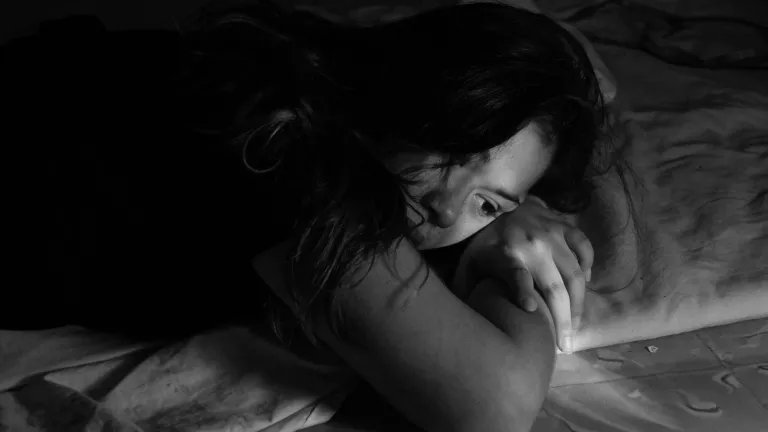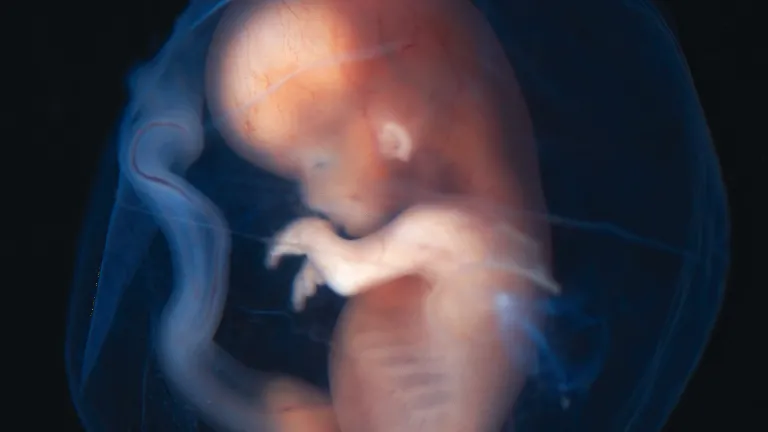Can a Woman Forget?

The psychological community does not recognize post-abortion syndrome (PAS). But it is real and does seriously affect many women—and men. What is it? Can someone heal from this traumatic experience? How? How can others help?
Claire is a vivacious mother of three. She and her husband enjoy serving in their local church in between chasing toddlers around. Claire is one of those people who always seems to be in a good mood. Nobody would ever guess that shortly after the birth of her third child, Claire became depressed. It got so bad that she had trouble getting out of bed in the morning. Sometimes she would go back to bed when her husband left for work.
There came a day when she experienced an intense desire to smother her baby with a pillow. She did not do it; she prayed for help. She never told anyone. What would people think if they knew? Someone would call Child Protective Services and have her children taken away. Was she a terrible mother?
There is another thing Claire never told anyone. Years before, Claire had an abortion. She had not thought about it in years. It was buried in the waters of baptism with her other sins, wasn’t it?
Jim is in his 50s. He is a quiet single man who shows up every time someone needs help moving furniture or doing heavy yard work. A long time ago his girlfriend had an abortion. He remembers the date every year. He does not talk about it. Sometimes he looks at the young people at church, especially the young men who would be about the age of his child. It makes him sad to think of what might have been.
Sara grew up going to church, but later got sidetracked by all that the world has to offer. She got married and had a child but soon divorced. Now, a few boyfriends and a few abortions later, Sara knows the truth about God and His Word, but she has become bitter and sarcastic. She wonders whether she has committed the unpardonable sin. Has she gone too far to repent? Sometimes she wonders if she even cares.
Guilt or conditioned response?
Since abortion was legalized in the United States in 1973, millions of people have thought of it as a quick solution to a sticky “problem.” A woman who had an abortion in her 20s then would be in her 50s or 60s today. Although it was legal, abortion was not socially acceptable in most circles. Many women who had abortions in the early years never told more than a tiny handful of people. It was largely a secret sin.
It is hard to find statistics on what is now being called post-abortion syndrome (PAS). The psychological community does not officially recognize it. Instead many psychologists interpret it as a tactic that religious pro-life people use to inflict guilt on others who have had abortions (something a true Christian would never do).
There are numerous Web sites dedicated to the idea that there is nothing wrong with having an abortion. According to these sites, guilt after an abortion is a conditioned response generated by a repressive society. A woman who feels too much guilt was probably emotionally abused in some way and fed old-fashioned ideas about her role in society. Their idea of counseling is to work through the guilt without any idea of repentance.
Approaching abortion in this way does not make the problem go away for someone who is suffering. The truth is that God has created women with the wonderful capacity to give birth to children and love those children in a special way. When this process is interrupted because of sin, it creates an identity crisis. How can one who was created with the capacity to have children agree to have a child killed, however small it was at the time? It is more than guilt over something done. It is an attack on a woman’s very nature. A popular saying goes: “Abortion: One dead, one wounded.”
Thankfully, many individual psychologists have done work in this area. PAS follows a pattern similar to other forms of post-traumatic stress disorder. After the abortion many women go right back into normal life. There are no emotions at all right then. Sometimes a woman may not even remember the details of the actual operation. This numbness can extend to other areas of life, including relationships with family, friends and other children. It is not easy to notice the numbness.
Signs of post-abortion syndrome
The signs of PAS are many. On the surface they may not seem abortion-related, especially to someone on the outside who does not know. Signs can range from general feelings of anxiety to suicidal depression to all sorts of self-punishing behavior. In rare cases an actual psychosis results that requires serious attention or hospitalization. Some women keep getting pregnant to replace the aborted baby just to abort another one and become further entangled in the mess. Others turn to drugs and alcohol or other addictive behaviors.
Often years go by before the emotions hit. They can be triggered by the birth of a child, the birth of someone else’s child, the inability to have a child, maybe even watching a good movie. A woman can become preoccupied with the age her child would be on any given day or with what her friends or colleagues would think of her if they knew.
Sometimes a woman who has had a secret abortion is taken aback when she is expecting another child. On the medical history forms are questions about previous pregnancies and their outcomes. She may lie about it and then experience anxiety about whether this will affect the health of her new baby. This kind of anxiety can even affect a woman’s later childbirth experiences. It can be a painful thing to bring up issues from the past. It can be more painful and damaging to hide them. It becomes a vicious circle that is hard to escape.
Counselors are aware that men can suffer the effects of an abortion as deeply as women. Some men have had their children aborted against their will or without their knowledge at the time. Worse, others may have consented to or urged the abortion and then repented after the damage was done. A man in this situation can feel angry and helpless. Counseling can direct him to positive actions to take to make himself a part of the solution.
Hope for recovery
Once a person (most often a woman) enters post-abortion counseling, there are as many paths the counseling can take as there are situations that brought her to the counseling. Many women benefit from giving their aborted child an identity. This includes naming the child and allowing herself to go through a normal mourning process. It can include writing the child a letter, buying him a stuffed animal or some other action that affirms the child’s identity. A woman who has had an abortion sometimes feels guilty about allowing herself to mourn, especially when she knows women who have had miscarriages or lost their children to other causes. It is, however, an important part of the healing process.
It is essential to look at abortion the way God looks at it. Sin can be forgiven, but it must be repented of—turned away from. The apostle Paul knew that many Christians had pasts that included terrible sins (1 Corinthians 6:11). He exhorted them to live in ways worthy of their calling as Christians. Things have not changed so much in 2,000 years.
Part of this turning away process can include doing some kind of service for others in a similar situation. This can be as simple as helping a young single mother with her children during a church service. It can mean becoming a counselor or crocheting blankets or sorting donated baby clothes for a crisis pregnancy center.
Michelle began having nightmares of her aborted child trying to find her. These began shortly after the birth of her second child. She went through counseling to work through her guilt and other emotions. Now she is a counselor. Her compassion is unsurpassed. She has been there and knows what it takes to heal.
The Smith family decided to adopt babies from crisis situations and raise them in a happy family environment.
However this service manifests itself, it is a changing of the focus from one’s self and past sins to showing outgoing concern for others. This is probably the best strategy for healing from any past hurt, including abortion.
Helping others
In the very possible event that someone you know decides to confide in you that she suffers from some aspect of PAS, be calm. The best thing is to listen. Someone who chooses you to be the first person she tells has probably agonized about it for a long time before saying anything. Let her know you care and that your feelings of friendship have not been diminished. Direct her to a pastor or counselor and offer to drive her to any counseling sessions since they can be very emotionally draining.
If you know someone like Sara, mentioned in the introduction, pray for her. Only God can break through her walls of indifference. It is usually not constructive to beat someone over the head with what she probably already knows. It is important to actively be her friend. You can do this without condoning her actions. Showing love for someone is never a waste of time.
We live in a world characterized by sin of every imaginable variety. Abortion and its affects are all around us. Part of our job of being salt and light in the world (Matthew 5:13-14) includes showing concern for those who struggle with guilt over past sins. Isaiah 49:15 says, “Can a woman forget her nursing child, and not have compassion on the son of her womb? Surely they may forget, yet I will not forget you.” God promises that upon repentance He will not forget those who love Him. Once someone repents, she is to go and sin no more; entering into a life of outgoing concern for others.
Note: All stories mentioned are based on the lives of real people. The names and circumstances have been altered to protect their identities.
A Few Resources Related to Abortion and PAS
A Solitary Sorrow: Finding Healing and Wholeness After Abortion by Teri Reisser and Dr. Paul Reisser (Shaw Books, 2000): medical information and details about PAS.
The Atonement Child by Francine Rivers (Tyndale House Publishers, 1999): a fictional story that includes many aspects of the abortion situation including PAS.
Her Choice to Heal: Finding Spiritual and Emotional Peace After Abortion by Sydna Masse (David C. Cook, 2009): a personal story of healing.
Care Net, national crisis pregnancy centers and their services: www.care-net.org; 1-800-395-HELP.
Ramah International, an organization dedicated to helping post-abortive women find healing. The name comes from Matthew 2:18, “A voice was heard in Ramah… Rachel weeping for her children, refusing to be comforted, because they are no more”: www.ramahinternational.org.





